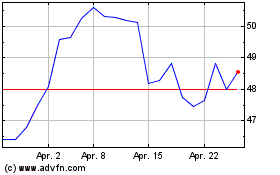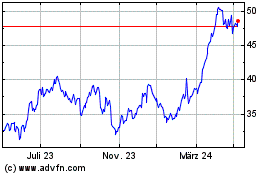European Car Makers Prep for Uncertainty After Strong Pricing in 1Q -- at a Glance
05 Mai 2023 - 3:44PM
Dow Jones News
By David Sachs
Now that the big European car makers have reported first-quarter
results, here is a look at how the manufacturers fared and where
they expect to go with pricing, a top-of-mind issue in light of
unclear economic conditions and fierce competition in China's
crowded electric-vehicle market.
--German auto making giant Volkswagen said improved price
positioning helped boost its group revenue. However, revenue fell
14.5% in China, where the price war is most acute due to intense
competition among battery-electric car makers. Chief Financial
Officer Arno Antlitz said pricing will remain strong, but the
company sees stiffer competition ahead. "We assume that competition
in the international automotive markets will intensify further,"
Volkswagen said in its earnings report. Average U.S. transaction
prices for Volkswagens are expected to have reached $49,000 in
April, up 9.8% on the year but down 0.5% month-on-month, RBC
Capital Markets analysts said.
--Netherlands-based Stellantis said pricing power contributed to
its first-quarter revenue gains and CFO Richard Palmer said this
week that pricing is "holding relatively stable compared to the
back end of 2022." However, the Jeep, Dodge and Peugeot maker's
pricing was 0.8% below the level anticipated by consensus,
according to Bernstein. Meanwhile, its inventory is higher than
peers' and price could be a lever to pull to get cars to customers
with future demand uncertain, RBC said. The analyst pegged
Stellantis's average U.S. transaction price at $57,000 in April, up
4.4% annually and 2.1% from March.
--French car maker Renault said revenue grew 30% in the quarter,
with robust pricing accounting for nearly a third of the increase.
Renault released first-quarter results in April amid Tesla's
industry-shaking price cuts, but CFO Thierry Pieton remained
resolute on holding prices steady. "The reality is, at the overall
group level, the plants are full," Mr. Pieton said. "We are at 100%
capacity generally speaking, so there is no big incentive to go cut
the prices and kill residuals and go in a spiral that some of the
competition is following." Renault's strategy is to use sticker
prices to offset costs and currency inflation, while tweaking them
with incentives such as financing discounts, it said.
--Premium car manufacturers Mercedes-Benz and BMW appear less
vulnerable to price cuts, Bernstein analysts said. Mercedes's
average sales price in the cars division rose 6% in the quarter to
76,000 euros ($83,940), a spokesman said, and the company raised
its margin target. BMW said it is enjoying strong pricing in the
new and used car markets. "However, we do expect the competitive
environment and pre-owned car markets to gradually normalize
through 2023," CFO Nicolas Peter said. Though uncertainty in China
is a factor, BMW has no plans to lower prices there, citing demand
evidenced by preliminary April figures, it said.
Write to David Sachs at david.sachs@wsj.com
(END) Dow Jones Newswires
May 05, 2023 09:29 ET (13:29 GMT)
Copyright (c) 2023 Dow Jones & Company, Inc.
Renault (EU:RNO)
Historical Stock Chart
Von Nov 2024 bis Dez 2024

Renault (EU:RNO)
Historical Stock Chart
Von Dez 2023 bis Dez 2024
